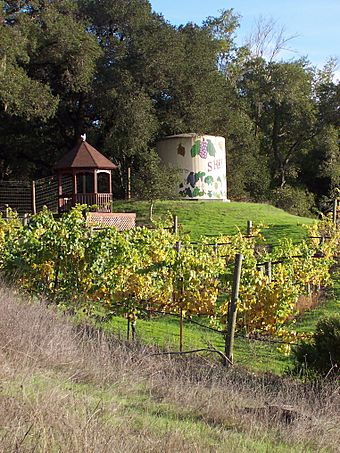Chalk Hill AVA facts for kids
| Wine region | |

Shiloh Hill Vineyard in the Chalk Hill AVA
|
|
| Type | American Viticultural Area |
|---|---|
| Year established | 1983, amended in 1988 |
| Country | United States |
| Part of | California, North Coast AVA, Northern Sonoma AVA, Russian River Valley AVA, Sonoma Coast AVA, Sonoma County |
| Soil conditions | Volcanic |
| Size of planted vineyards | 1,000 acres (4 km2) |
| Grapes produced | Cabernet Sauvignon, Chardonnay, Malbec, Merlot, Petit Verdot, Pinot gris, Sangiovese, Sauvignon blanc, Sauvignon gris, Semillon, Syrah, Zinfandel |
The Chalk Hill AVA is a special farming area in Sonoma County, California. AVA stands for American Viticultural Area. This means it's a recognized region for growing grapes, especially for making wine. The Chalk Hill AVA is known for its unique soil. This soil is a chalky white color. It's great for growing white grapes like Chardonnay and Sauvignon blanc.
This area is found in the northeast part of the Russian River Valley AVA. Most of the grape farms, called vineyards, are located near the town of Windsor. They are mostly east of Highway 101. The name "Chalk Hill" comes from its special soil. This soil is made of white volcanic ash. It helps the grapes grow well. Many wineries in this region are on the western side of the Mayacamas Mountains.
Contents
What is the Chalk Hill AVA?
The Chalk Hill AVA is a specific area where grapes are grown. It was officially recognized in 1983. This recognition helps people know where the grapes come from. It also shows that the area has special conditions for growing certain types of grapes. The AVA covers about 33 square miles (85 square kilometers) of land.
Where is Chalk Hill Located?
The Chalk Hill AVA is in the northern part of Sonoma County. It's a part of the larger Russian River Valley AVA. You can find many vineyards on the western slopes of the Mayacamas Mountains. These vineyards are at different heights, from about 200 to 1300 feet (60 to 400 meters) above sea level.
What Makes Chalk Hill Special?
Chalk Hill is unique because of its climate and soil. These two things work together to make special grapes. The area has a warmer climate than nearby regions. This is due to something called a "thermal belt." A thermal belt is a warm air zone. It helps the grapes ripen faster.
How Does the Climate Affect Grapes?
Because of the warmer climate, grapes in Chalk Hill ripen earlier. Grapes are often ready to be picked in September. In other nearby areas, picking usually happens in October. This earlier harvest is a key feature of the Chalk Hill AVA. It helps create the unique flavors of the wines from this region.
What is the Soil Like in Chalk Hill?
The name "Chalk Hill" comes from the white, chalk-like soil. But it's not actually chalk! The soil is made of volcanic ash, sand, and silt. This ash came from Mount St. Helena over many years. This special soil is not very rich in nutrients. This means the grapevines don't grow too big. Instead, they focus their energy on making flavorful grapes. This type of soil is very good for grape growing.

